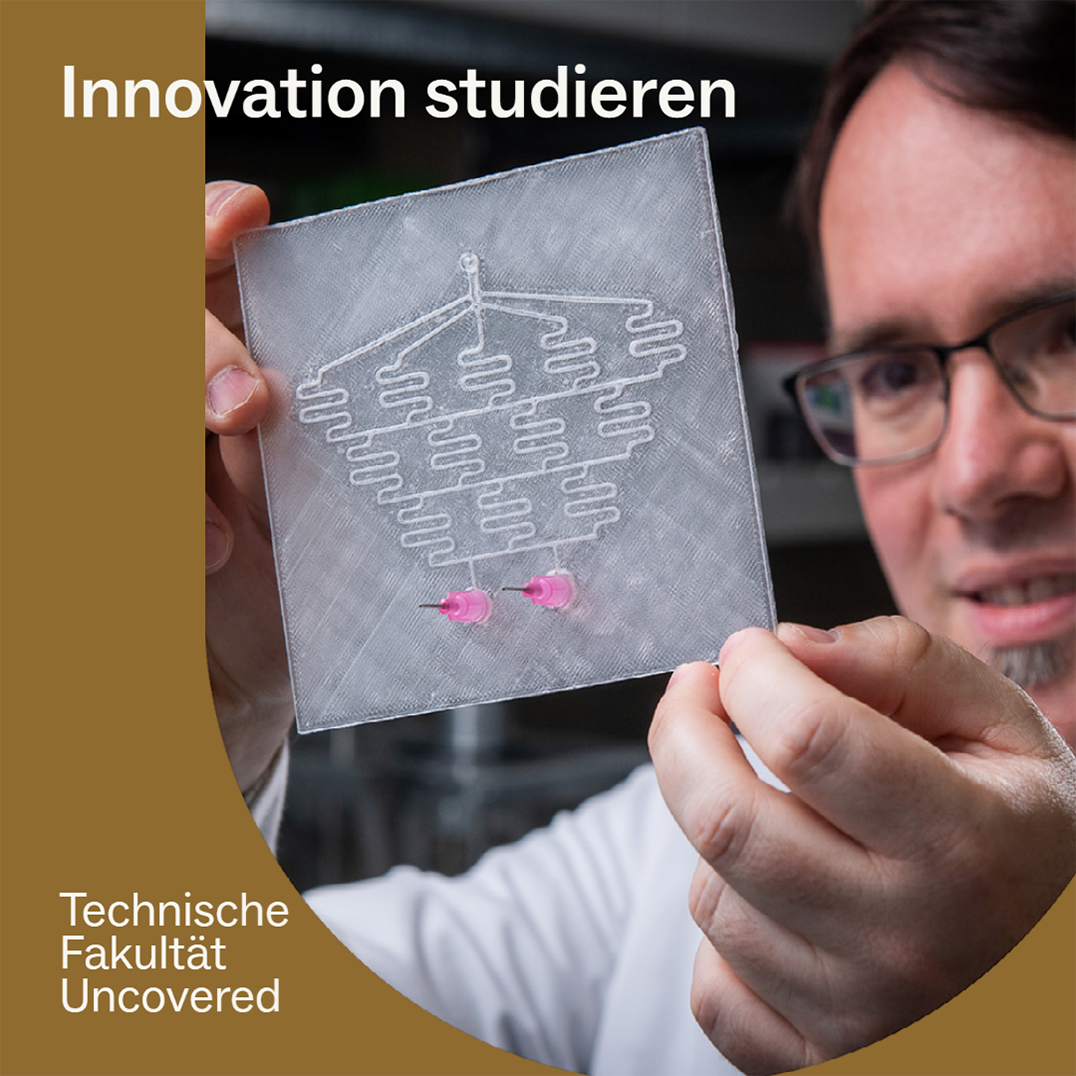News & Press
"Technische Fakultät uncovered" with Bastian Rapp
In an interview, livMatS researcher Bastian Rapp gives insights into his work

"It is especially important to me that students recognize how incredibly vital their skills, knowledge, and ideas are and will be", says Bastian Rapp.
Each week, the series "Technische Fakultät uncovered" introduces a professor from the Faculty of Engineering of the University of Freiburg. The professors give an exciting insight into their work as scientists and teachers and also reveal one or two secrets about themselves – this time: Bastian Rapp, Professor of Microsystems Engineering and Full Professor of Process Engineering.
Mr. Rapp, what do you associate with microsystems engineering?
Bastian Rapp: Sustainability is the imperative of the present; no other question moves humanity, especially the younger generation, so deeply. And rightfully so – if we don't find a way to solve the climate crisis and the problems of an unsustainable economy, we will face challenges that we won't be able to overcome anymore. As scientists, our task is to propose solutions today so that it doesn't come to that. The essence of microsystems engineering is to require fewer resources, materials, space, and energy to achieve the same or higher functionality. No other science has made a comparable leap in technology in recent years - just think of the supercomputers we carry with us in our pockets today. All of this wouldn't have been possible without microsystems engineering. Few technologies can boast such an innovative leap.
What is your main field of research and why is it so exciting for you?
In my research, I am concerned with the question of which new materials and material systems we need to solve technical and societal problems, how to manufacture these materials, and how to process them. This is an exciting field of research because materials are the core ingredient for almost every technical system. For example, at my chair, the Laboratory of Process Technology, we have invented the injection molding of glass in the 3D printing process. However, we also research tactile surfaces that allow visually impaired people to perceive texts and images through touch. We contemplate how to store heat in materials, how to program materials, and what the next generation of 3D printing processes will look like, where complex components can be created directly in free space.
What do the students learn from you and which aspects are particularly important to you?
It is especially important to me that students recognize how incredibly vital their skills, knowledge, and ideas are and will be. One of my main tasks is to educate the next generation of pioneers, problem solvers, and innovators. In the minds of young people, the solutions to the problems of our time will emerge and must emerge. I believe it is immensely important for young individuals to understand that it is not only about completing a specialized degree program or obtaining good grades on paper. While those are important, it is even more crucial to comprehend that university is not just a gateway that one passes through and closes behind them. The university is the key that can unlock countless doors – one only needs to be open to it.
What advice would you give to students at the beginning of their studies?
Keep your eyes open, ask questions, and seek solutions. Don't just aim for the minimum required. Try to discover the maximum potential you can achieve. Challenge yourself, your fellow students, and professors. Instead of merely finding the best solutions to a problem, try to determine if the problem itself is the relevant challenge. Why must it be done this way? Why does everyone do it like this? Shouldn't it be done completely differently? And if so, how? No employer will allow you to ask these questions as extensively, comprehensively, and extensively as the university does. Scientists must think and act beyond the conventional boundaries. We need this freedom to come up with truly new ideas, approaches, and solutions. The business world always needs to ensure that a solution is financially viable. That's necessary and good - that's how the economy should work. However, science does not have this limitation. Students do not have this limitation either. During your studies, you have the time and space to thoroughly observe, reconsider, and comprehend everything. Seize this opportunity!
What are the career prospects for graduates?
Career prospects in STEM subjects have never been better. The number of challenges and problems requiring intelligent engineers has never been higher, and the future has never been more exciting for people who enjoy working on solutions to socially relevant problems.
What is your motto for teaching and research?
Always keep your eyes on the horizon: What lies directly ahead can make walking difficult. But, you shouldn't let that get in your way. It's important to always keep an eye on where you're going if you just keep walking.
What do you like best about the Faculty of Engineering?
There are really no relevant questions in the STEM subjects that we don't cover here. For every question, you will find someone who can answer it for you. And the openness with which people collaborate and research here is incomparable. Anyone who is bored has never been here!
What you think students should know about you?
I always wanted to be an inventor. When I was told that wasn't a job you could train for, I opted to become a scientist – which basically had the same job description.
Original Article on the website of the Faculty of Engineering
